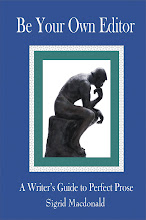Indefatigable… pristine… eviscerate… antithetical… arduous… enervating. What do these words have in common? We don't see them that often.
An excellent way to improve your vocabulary and your writing is to read, read, and read some more. That way you'll learn new words and you will also see how certain things look in print; this is particularly good for writing dialogue and punctuation.
Choose things that interest you. If you don't like fiction, read nonfiction. If books take too much time, pick up a magazine or follow a blog dealing with a topic you really like. Or listen to a book on audio on your iPod or on CD in your car.
Don't turn it into homework, but do find a way to incorporate new words into your daily or weekly routine.
Learn more about word usage in my third book, Be Your Own Editor. When should you use between or among, further and farther, or complement and compliment? Find out in BYOE, available on Amazon.com in print and now a bestseller on Kindle. (http://tinyurl.com/4v249th)
Monday, March 28, 2011
Sunday, March 13, 2011
Today's Writing Tip Is on Comma Placement
Lynne Truss said it best with the title of her blockbuster hit Eats, Shoots & Leaves. That sentence can have two meanings depending on where we place the comma. If we omit the comma after the word Eats, we may think that someone eats bamboo shoots and takes off. But if we keep the comma, we know that a person ate, shot something and left. (Sarah Palin targeting moose in Alaska?)
Likewise with the following example: my aunt believed the babysitter and John and I were unfairly punished. What happens if I change the comma to this: My aunt believed the babysitter, and John and I were unfairly punished.
The first sentence could mean that the aunt thought that three people were unfairly punished -- the babysitter, John and the writer of the sentence. But it could also mean that the aunt believed a story that the babysitter relayed, thus, the aunt thought John and the writer were unfairly punished. The first sentence is ambiguous. If the writer wants to say that he and John were wrongly accused and reprimanded, the best way to write that would be: “My aunt believed the babysitter, and John and I were unfairly punished.”
Read more about punctuation in my third book, Be Your Own Editor, available in print (http://tinyurl.com/3xkoths) and now a bestseller on Kindle (http://tinyurl.com/3y3nuzb). Or get 20% off the regular price by writing directly to me at sigridmac at rogers.com.
*Please note that writing tips are nonpartisan and I already made fun of a Democrat last time!
Likewise with the following example: my aunt believed the babysitter and John and I were unfairly punished. What happens if I change the comma to this: My aunt believed the babysitter, and John and I were unfairly punished.
The first sentence could mean that the aunt thought that three people were unfairly punished -- the babysitter, John and the writer of the sentence. But it could also mean that the aunt believed a story that the babysitter relayed, thus, the aunt thought John and the writer were unfairly punished. The first sentence is ambiguous. If the writer wants to say that he and John were wrongly accused and reprimanded, the best way to write that would be: “My aunt believed the babysitter, and John and I were unfairly punished.”
Read more about punctuation in my third book, Be Your Own Editor, available in print (http://tinyurl.com/3xkoths) and now a bestseller on Kindle (http://tinyurl.com/3y3nuzb). Or get 20% off the regular price by writing directly to me at sigridmac at rogers.com.
*Please note that writing tips are nonpartisan and I already made fun of a Democrat last time!
Subscribe to:
Comments (Atom)


